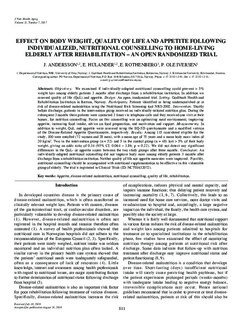| dc.contributor.author | Andersson, J. | |
| dc.contributor.author | Hulander, E. | |
| dc.contributor.author | Rothenberg, Elisabet | |
| dc.contributor.author | Iversen, P. Ole | |
| dc.date.accessioned | 2018-03-21T08:50:07Z | |
| dc.date.available | 2018-03-21T08:50:07Z | |
| dc.date.issued | 2017 | |
| dc.identifier.citation | Andersson, J., Hulander, E., Rothenberg, E., Iversen, P.O. (2017). Effect on body weight, quality of life and appetite following individualized, nutritional counselling to home-living elderly after rehabilitation: an open randomized trial. The Journal of Nutrition, Health & Aging, 21(7), 811-818. | nb_NO |
| dc.identifier.uri | http://hdl.handle.net/11250/2491390 | |
| dc.description.abstract | Objectives: We examined if individually-adapted nutritional counselling could prevent > 5% weight loss among elderly patients 3 months after discharge from a rehabilitation institution. In addition we assessed quality of life (QoL) and appetite.
Design: An open, randomized trial.
Setting: Godthaab Health and Rehabilitation Institution in Bærum, Norway.
Participants: Patients identified as being undernourished or at risk of disease-related malnutrition using the Nutritional Risk Screening tool NRS-2002.
Intervention: Shortly before discharge, patients in the intervention group received an individually-tailored nutrition plan. During the subsequent 3 months these patients were contacted 3 times via telephone calls and they received one visit at their homes, for nutrition counselling. Focus on this counselling was on optimizing meal environment, improving appetite, increasing food intake, advice on food preparation, and motivation and support.
Measurements: In addition to weight, QoL and appetite were assessed using the EQ-5D questionnaire and a modified version of the Disease-Related Appetite Questionnaire, respectively.
Results: Among 115 considered eligible for the study, 100 were enrolled (72 women and 28 men), with a mean age of 75 years and a mean body mass index of 20 kg/m2. Two in the intervention group (n = 52) and 5 in the control group (n = 48) lost > 5% of their body weight, giving an odds ratio of 0.34 (95% CI: 0.064 – 1.86; p = 0.22). We did not detect any significant differences in the QoL- or appetite scores between the two study groups after three months.
Conclusion: An individually-adapted nutritional counselling did not improve body mass among elderly patients 3 months after discharge from a rehabilitation institution. Neither quality of life nor appetite measures were improved. Possibly, nutritional counselling should be accompanied with nutritional supplementation to be effective in this vulnerable group of elderly. | nb_NO |
| dc.publisher | The Journal of Nutrition, Health & Aging | nb_NO |
| dc.subject | appetite | nb_NO |
| dc.subject | disease-related malnutrition | nb_NO |
| dc.subject | nutritional counselling | nb_NO |
| dc.subject | quality of life | nb_NO |
| dc.subject | rehabilitation | nb_NO |
| dc.title | Effect on body weight, quality of life and appetite following individualized, nutritional counselling to home-living elderly after rehabilitation – An open randomized trial | nb_NO |
| dc.type | Journal article | nb_NO |
| dc.source.pagenumber | 811-818 | nb_NO |
| dc.source.volume | 21 | nb_NO |
| dc.source.journal | The Journal of Nutrition, Health & Aging | nb_NO |
| dc.source.issue | 7 | nb_NO |
| dc.identifier.doi | https://doi.org/10.1007/s12603-016-0825-8 | |
| dc.description.localcode | måsjekkes | |
